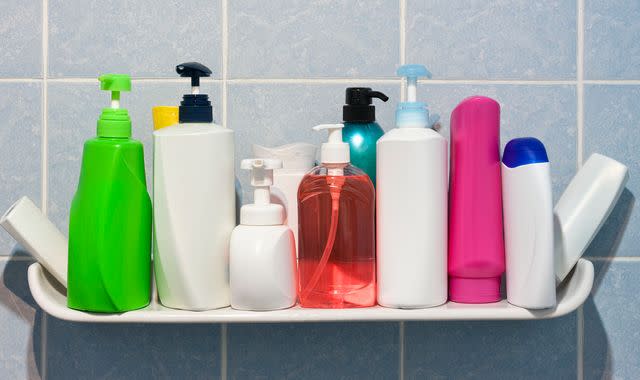Soap, shampoo and toothpaste considered 'luxury items' amid soaring poverty in UK, Gordon Brown says

Children in the UK are suffering "the highest levels of poverty in living memory" - with basic toiletries including shampoo, soap and toothpaste now considered "luxury items", Gordon Brown has said.
Speaking to the Politics Hub with Sophy Ridge, the former prime minister said he was "shocked and ashamed" at the current levels of poverty in Britain, which he said had not been seen for "many, many years".
Mr Brown raised the plight of what he called "austerity's children" - those who were born in the last 15 years "who are growing up poor, who probably have never known what it is to be anything other than poor".
Politics latest: Asylum seekers detained for removal to Rwanda
There are currently 4.3 million children who are officially in poverty after housing costs - translating to 30% of all children in the UK, according to statistics published by the Department for Work and Pensions (DWP) in March.
The figure is an increase of 100,000 on the previous year.
Mr Brown, the most recent Labour prime minister and a former chancellor, told the Politics Hub the cost of living crisis has exacerbated the already-difficult situation for many.
"We're running a multi-bank which is a food bank, clothes bank, furnishings bank, toiletries bank, baby bank, all rolled into one," he said.
"Last winter, people were desperate for bedding just to keep warm. They'd stop heating their homes and they were simply trying to heat themselves.
"As we move into these summer months - toiletries people cannot afford and consider soap and shampoo and toothpaste as a luxury item.
"And that is why the biggest hospital admissions for children under 10 - between five and nine - is for dental decay. And that's three-and-a-half times higher in the poorer communities than the richer communities. So we are seeing austerity's children."
The former prime minister urged Chancellor Jeremy Hunt to take action in the autumn statement he is expected to deliver later in the year, while his advice for Sir Keir Starmer - who is on course to be the next Labour prime minister - was that he should "stick to his principles".
Watch the Politics Hub with Sophy Ridge from 7pm to 8pm Monday to Thursday
Sir Keir has angered some in his party by so far refusing to abolish the two child benefit cap, which the Labour leader has said he cannot commit to due to the "tough decisions" his party will face if propelled into power.
Mr Brown once again repeated his calls for a "root and branch" review of Universal Credit, which he said had "gone wrong" - including the two-child benefit cap that was introduced by the Conservative government in 2017 and prevents parents from claiming child tax credit or universal credit for more than two children.
He indicated to Ridge that he believed the Labour leader should drop the cap, saying : "I think they should do a review, a root and branch review of Universal Credit.
"And you've got to look at every aspect of Universal Credit which has gone wrong. And it's not, of course, just the two child rule that is causing problems - it's the caps that have been placed on, for example, housing benefits."
Read more from Sky News:
Slovakia's PM in hospital after 'assassination attempt'
Warning to boil tap water after 22 cases of diarrhoea disease
Appealing to Sir Keir as he prepares for the possibility of reaching Downing Street, Mr Brown said the Labour leader should "never lose sight of why you're there in the first place".
"If you do lose sight of that, then you will fail. If you don't lose sight of it and commit to your principles in implementing them, then I think you'll succeed, and I'm sure he will," he said.
👉 Listen above then tap here to follow Electoral Dysfunction wherever you get your podcasts 👈
The former chancellor also urged Mr Hunt to continue the £500m household support fund that is due to expire at the end of September, and called for a children's fund to be created alongside foundations, charities, businesses and governments at both local and national levels.
A government spokesperson said: "We will continue to make every effort to tackle child poverty, which is down since 2010. Our £108bn cost of living package also prevented 1.3 million people, including 300,000 children, falling into absolute poverty with the heightened cost of living pressures driven by the war in Ukraine and impact of COVID."
"Children are less likely to be in poverty where all adults work, and our £2.5bn back to work plan will help over a million people break down barriers to work while we also cut taxes, boost the national living wage and drive down inflation to support hard-working families."

 Yahoo News
Yahoo News 
